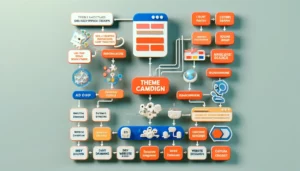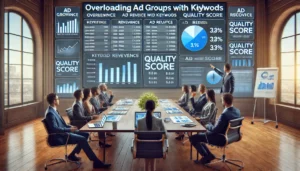Quality Score Optimisation: A Comprehensive Guide

Quality Score Optimisation is a key part of running successful PPC campaigns. It influences how your ads perform, how much you pay per click, and where your ads appear. This guide will help you understand Quality Score, why it matters, and how to improve it.
Key Takeaways
- Quality Score impacts ad performance and costs in PPC campaigns.
- Effective keyword research is essential for improving Quality Score.
- Crafting high-quality ad copy can boost your Quality Score.
- A good landing page experience is crucial for a high Quality Score.
- Using data and analytics helps in continuously optimising your Quality Score.
Understanding Quality Score Optimisation
What is Quality Score?
Quality Score is a metric used by Google Ads to measure the quality and relevance of your ads, keywords, and landing pages. It ranges from 1 to 10, with 10 being the highest. A higher Quality Score can lead to lower costs and better ad positions. This score is crucial for determining how well your ads perform in auctions and how much you pay per click.
Importance of Quality Score in PPC Campaigns
The Quality Score plays a vital role in the success of your PPC campaigns. A high Quality Score can:
- Increase the likelihood of your ads being shown.
- Lower your cost-per-click (CPC).
- Improve your ad’s position on the search results page.
By focusing on improving your Quality Score, you can boost your overall campaign performance and get more value from your ad spend.
Components of Quality Score
Quality Score is determined by three main components:
- Ad Relevance: How closely your ad matches the intent of the user’s search query.
- Expected Click-Through Rate (CTR): The likelihood that users will click on your ad when it appears.
- Landing Page Experience: The quality and relevance of the landing page that users are directed to after clicking your ad.
Each of these components is rated as “above average,” “average,” or “below average,” and they collectively contribute to your overall Quality Score.
Quality Score Optimisation: Effective Keyword Research Strategies
Identifying Relevant Keywords
When we start with keyword research, the first step is to identify relevant keywords. This means finding words and phrases that potential customers are likely to use when searching for products or services like ours. Using the right keywords can make a huge difference in how well our ads perform. We should always think about what our audience is searching for and how we can meet their needs.
Using Keyword Research Tools (Quality Score Optimisation)
There are many tools available to help us find the best keywords. Tools like Google Keyword Planner, Wordstream, and Keyword.io can provide valuable insights. These tools can show us how often certain keywords are searched and how competitive they are. By using these tools, we can make informed decisions about which keywords to target.
Incorporating Long-Tail Keywords
Long-tail keywords are longer and more specific keyword phrases. They might not be searched as often, but they can be very effective. These keywords often have less competition and can attract more targeted traffic. For example, instead of just using “dog collars,” we might use “best dog collars for small dogs.” This can help us reach a more specific audience and improve our chances of conversion.
Remember, effective keyword research is the foundation of a successful PPC campaign. By identifying the right keywords, using research tools, and incorporating long-tail keywords, we can optimise our campaigns and achieve better results.
Quality Score Optimisation: Enhancing Landing Page Experience
Creating a user-friendly landing page is essential for keeping visitors engaged. We need to ensure that our landing pages are easy to navigate and visually appealing. This means using clear headings, concise text, and intuitive layouts. A well-designed landing page can significantly reduce bounce rates and increase conversions.
Our landing pages must align closely with our ad content. When users click on an ad, they expect to find information that matches their search intent. If there’s a disconnect, they will likely leave the page. By ensuring that our landing pages reflect the promises made in our ads, we can improve user satisfaction and boost our Quality Score.
Page load speed is a critical factor in user experience. Slow-loading pages can frustrate visitors and lead them to abandon our site. To enhance load speed, we can:
- Minimise HTTPS requests
- Compress images
- Enable caching
- Use a Content Delivery Network (CDN)
Studies have shown that faster pages lead to higher conversion rates. For instance, Walmart found that for every one-second improvement in page load time, conversions increased by up to 2%. This highlights the importance of optimising our landing pages for speed.
At our London PPC agency, we understand the importance of a seamless landing page experience. By focusing on user-friendly design, content alignment, and load speed, we can help you achieve better results in your PPC campaigns.
Quality Score Optimisation: Improving Expected Click-Through Rate (CTR)
Expected Click-Through Rate (CTR) is a prediction of how likely it is that your ad will be clicked when shown. This forecast is based on your ad’s past performance. Essentially, it measures how appealing and relevant your ad appears to users.
Highlighting Unique Selling Propositions
To make your ads stand out, we need to showcase how our product or service solves users’ problems. This means highlighting our unique selling propositions (USPs). For instance, if we’re a PPC ecommerce agency, we should emphasise our expertise in managing ecommerce PPC campaigns. This can make our ads more attractive and relevant to potential customers.
Using Ad Extensions Effectively (Quality Score Optimisation)
Ad extensions provide additional information and make our ads more enticing. We should experiment with different types of extensions, such as sitelinks, callouts, and structured snippets. Tailoring these extensions to each campaign can significantly improve our CTR. For example, a Google AdWords PPC campaign might benefit from sitelinks that direct users to specific product categories.
Employing Psychological Triggers
Incorporating psychological triggers like urgency, scarcity, and social proof can dramatically increase our CTR. Phrases like “limited time offer” or “only a few left in stock” can create a sense of urgency. Similarly, showcasing customer reviews or testimonials can build trust and encourage clicks.
Improving our expected CTR not only boosts our Quality Score but also enhances our ad placements and reduces costs. It’s a worthwhile investment for any PPC management strategy.
By focusing on these strategies, we can make our ads more compelling and relevant, ultimately driving higher click-through rates and better campaign performance.
Quality Score Optimisation: Creating Theme-Based Campaign Structures
Creating theme-based campaign structures is essential for effective PPC management. By organising our campaigns around specific themes, we can ensure that our ads are more relevant to the search queries they target. This approach not only helps in better budget allocation but also enhances the likelihood of our ads reaching the intended audience.
Organising Ad Groups by Themes
When we organise ad groups by themes, we make it easier for Google to understand the content and intent of our ads. For instance, a campaign focused on DIY Website Design can be broken down into more specific ad groups like “Website Design Templates” and “Website Design Tutorials.” This method ensures that our ads are more relevant and likely to achieve higher click-through rates.
Budget Allocation Strategies (Quality Score Optimisation)
Effective budget allocation is crucial for the success of any PPC campaign. By creating theme-based campaigns, we can allocate our budget more efficiently. This allows us to focus our spending on the most relevant and high-performing ad groups, thereby maximising our return on investment.
Monitoring and Adjusting Campaigns
Continuous monitoring and adjustment are vital for maintaining the effectiveness of our campaigns. By regularly reviewing the performance of our theme-based ad groups, we can make data-driven decisions to optimise our strategies. This ensures that our campaigns remain relevant and effective over time.
By maintaining a theme-based campaign and ad group structure, we can improve Google’s comprehension of the content and intent of our ads, leading to more relevant ad placements and possibly higher click-through rates.
Quality Score Optimisation: Leveraging Data and Analytics
In the world of PPC, data and analytics are our best friends. They help us understand what’s working and what needs improvement. By tracking Quality Score metrics, we can make informed decisions that drive better results. Quality Score metrics are essential for optimising our campaigns and ensuring we get the best return on investment.
Tracking Quality Score Metrics
To effectively track Quality Score metrics, we need to focus on several key areas:
- Click-Through Rate (CTR): This metric shows how often people click on our ads. A higher CTR usually means our ads are relevant and engaging.
- Ad Relevance: This measures how closely our ad matches the intent of the user’s search query. Ensuring our ads are highly relevant can improve our Quality Score.
- Landing Page Experience: This evaluates the quality and relevance of our landing page. A better landing page experience can lead to higher Quality Scores.
Using Google Analytics for Insights (Quality Score Optimisation)
Google Analytics is a powerful tool that provides valuable insights into our PPC campaigns. By analysing data from Google Analytics, we can identify trends and patterns that help us optimise our campaigns. For example, we can see which keywords are driving the most traffic and conversions, allowing us to focus our efforts on the most effective keywords.
Adjusting Strategies Based on Data
Once we have gathered data and insights, it’s crucial to adjust our strategies accordingly. This might involve tweaking ad copy, adjusting bids, or refining our keyword list. By continuously monitoring and adjusting our campaigns, we can ensure they remain effective and deliver the best possible results.
Leveraging data and analytics is not just about collecting information; it’s about using that information to make smarter decisions and improve our PPC campaigns.
In conclusion, by effectively tracking Quality Score metrics, using tools like Google Analytics, and adjusting our strategies based on data, we can optimise our PPC campaigns and achieve better results. Remember, the key to success in PPC is continuous improvement and staying informed about the latest trends and best practises.
Quality Score Optimisation: Common Pitfalls and How to Avoid Them
In our journey to optimise Quality Score, we often encounter common pitfalls that can hinder our progress. Recognising these pitfalls and knowing how to avoid them is crucial for a successful PPC campaign.
Overloading Ad Groups with Keywords
One of the most frequent mistakes is overloading ad groups with too many keywords. This can dilute the relevance of your ads and negatively impact your Quality Score. Instead, we should focus on creating tightly themed ad groups with a smaller number of highly relevant keywords. This approach ensures that our ads are more targeted and effective.
Ignoring Landing Page Quality (Quality Score Optimisation)
Another common pitfall is neglecting the quality of landing pages. A slow-loading page or a poor mobile experience can hurt your Quality Score. Use tools like Google’s PageSpeed Insights or GTmetrix to identify and fix these issues. Additionally, ensure that your landing page content is relevant to the ad and provides a seamless user experience.
Neglecting Continuous Optimisation
Continuous optimisation is key to maintaining and improving Quality Score. Regularly review your campaigns’ performance, adjusting where necessary. Ongoing optimisation helps in identifying areas that need improvement and implementing changes that can enhance your campaign’s effectiveness.
It’s essential to stay proactive and keep refining our strategies to achieve the best results in our PPC campaigns.
Advanced Techniques for Quality Score Optimisation
A/B Testing for Ads and Landing Pages
A/B testing is a powerful method to determine what works best for your ads and landing pages. By comparing two versions, we can identify which one performs better. This helps us make data-driven decisions to improve our campaigns. Regular testing and refinement are key to maintaining a high-quality score.
Utilising Machine Learning Tools (Quality Score Optimisation)
Machine learning tools can analyse vast amounts of data to provide insights that humans might miss. These tools can help us optimise bids, select the best keywords, and even predict future trends. By leveraging these tools, we can stay ahead of the competition and ensure our campaigns are always performing at their best.
Implementing Advanced Targeting Options
Advanced targeting options allow us to reach the right audience at the right time. By using features like demographic targeting, location targeting, and device targeting, we can ensure our ads are seen by the people most likely to convert. This not only improves our quality score but also maximises our return on investment.
Quality score optimisation is an ongoing endeavour, demanding continuous testing and refinement. To boost your quality score, you must enhance your performance in the three core factors while addressing several subfactors.
In summary, advanced techniques like A/B testing, machine learning tools, and advanced targeting options are essential for optimising your quality score. By implementing these strategies, we can ensure our campaigns are always performing at their best.
Quality Score Optimisation: Case Studies and Success Stories
Real-World Examples of Quality Score Improvement
In our journey, we’ve encountered numerous businesses that have significantly improved their Quality Scores. One standout example is a mid-sized eCommerce company that faced challenges during the pandemic-driven eCommerce boom. By leveraging PPC and SEM services, they adapted their marketing strategies and saw a remarkable increase in their Quality Score, leading to enhanced online visibility and sales performance.
Lessons Learned from Successful Campaigns (Quality Score Optimisation)
From our experience, the key to a successful campaign lies in continuous optimisation. One of our clients, a tech startup, initially struggled with low Quality Scores. Through rigorous A/B testing and refining their ad copy, they managed to boost their scores and, consequently, their click-through rates. Continuous optimisation is crucial for maintaining high Quality Scores.
Applying Best Practises to Your Campaigns
To replicate these successes, we recommend focusing on a few best practises:
- Conduct thorough keyword research to ensure relevance.
- Regularly update and test your ad copy.
- Ensure your landing pages are user-friendly and aligned with your ads.
By following these steps, you can navigate the changing landscape and achieve better results in your PPC campaigns.
Discover how our clients have achieved outstanding results with our PPC services. From boosting brand awareness to driving sales, our case studies showcase real success stories. Ready to see similar results for your business? Visit our website to learn more.
Conclusion
In summary, optimising your Quality Score is a continuous journey that requires regular attention and fine-tuning. By focusing on key areas such as keyword relevance, ad copy, and landing page experience, you can significantly improve your ad performance. Remember, a higher Quality Score not only lowers your cost-per-click but also enhances your ad’s visibility and effectiveness. Keep testing different strategies, stay updated with the latest trends, and always aim for relevance and user satisfaction. With dedication and the right approach, you can achieve remarkable results in your PPC campaigns.
Frequently Asked Questions
What is a Quality Score?
A Quality Score is a number from 1 to 10 that Google gives to your ads based on their relevance and quality. It looks at things like how well your ad matches the keywords, how likely people are to click on it, and how good the landing page is.
Why is Quality Score important in PPC campaigns?
Quality Score is crucial because it affects how often your ads appear and how much you pay per click. A higher Quality Score means your ads are more likely to show up and cost less.
What factors influence Quality Score?
Quality Score is influenced by three main things: the relevance of your ad to the keywords, the expected click-through rate (CTR), and the quality of the landing page.
How can I improve my Quality Score?
To improve your Quality Score, make sure your ads are relevant to the keywords, your landing page is user-friendly and loads quickly, and your ad copy is engaging and matches the user’s intent.
What are long-tail keywords and why should I use them?
Long-tail keywords are longer and more specific keyword phrases. They are less competitive and can attract more targeted traffic, making them useful for improving Quality Score.
What is Dynamic Keyword Insertion?
Dynamic Keyword Insertion is a feature that automatically updates your ad text to include the keyword someone is searching for. This makes your ad more relevant to the search query, which can improve your Quality Score.
How does landing page experience affect Quality Score?
The landing page experience affects Quality Score by measuring how relevant and useful your landing page is to the people who click on your ad. A better landing page experience can lead to a higher Quality Score.
What are ad extensions and how do they help?
Ad extensions are extra bits of information you can add to your ads, like phone numbers or links to specific pages on your website. They make your ad more useful and can improve your click-through rate, which helps your Quality Score.
Author
Search Blog
Free PPC Audit
Subscribe to our Newsletter
The Voices of Our Success: Your Words, Our Pride
Don't just take our word for it. With over 100+ five-star reviews, we let our work-and our satisfied clients-speak for us.
"We have been working with PPC Geeks for around 6 months and have found Mark and the team to be very impressive. Having worked with a few companies in this and similar sectors, I rate PPC Geeks as the strongest I have come across. They have taken time to understand our business, our market and competitors and supported us to devise a strategy to generate business. I value the expertise Mark and his team provide and trust them to make the best recommendations for the long-term."
~ Just Go, Alasdair Anderson




